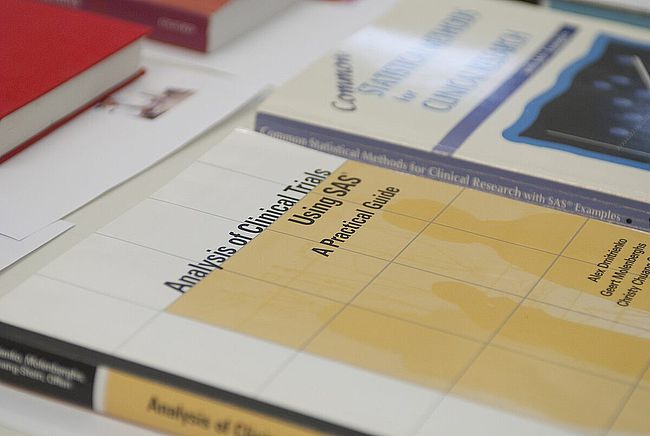
Master of Science (MSc)
Mathematical Data Science
More about the course
The Mathematical Data Science programme focuses on the mathematical foundations of data science. These mathematical principles shape data science and will continue to do so in the future, regardless of short-term developments. You will learn about the underlying quantitative methods and how to develop them further and apply them specifically to real-world data problems.
In addition to mathematical expertise, you will also learn structured thinking and systematic working methods – skills that are highly valued in practice.
Master of Science (MSc)
- Full-time
- each winter semester
- English
- No restriction
120
4
Latest news
The Ulmer Master Days take place from 17 to 21 November 2025. Check out what our faculty has to offer here.
Who is the programme for?
If you want to truly understand and help shape the methodology behind machine learning, AI, and data analysis, you've come to the right place. The degree programme is aimed at anyone who:
- is interested in the mathematical methods of data science,
- wants to use mathematical models in various fields of application,
- wants to conduct data-driven research or work.
A bachelor's degree in a mathematical subject is required. It is also possible to transfer from related subjects.
Structure of the study programme
In the Master's programme in Mathematical Data Science, you will deepen your mathematical knowledge from your Bachelor's programme specifically in the context of modern data analysis.
You will learn:
- how to evaluate algorithms,
- how to develop new data science methods,
- how to apply mathematical theories to real data from a wide range of professional fields,
- how to work scientifically.
In addition to traditional lectures, project work is also a central element of your studies. You can find the research specializations at our faculty here.
Teaching
At Ulm University, we place great importance on providing you with the best possible education, intensive support and an open learning atmosphere. This includes, in particular, direct and personal contact with teaching staff and individual counseling opportunities.
The broad range of subjects offered by our faculty opens up a wide range of options for your studies, particularly when it comes to choosing your specializations and areas of focus. In addition, the close contact between the faculty and industry makes it easy for you to participate in interdisciplinary research projects and collaborate with companies.
Finally, our teaching incubators CODEcenter and MATHFEED ensure up-to-date programming interfaces as well as exercise formats that remain useful beyond ChatGPT.
Programme structure Master Mathematical Data Science
Why Ulm University?
The following characterises studying at Ulm University:
- Personal atmosphere: At Ulm University you don't study in an anonymous mass organisation. Overcrowded lecture halls or long waiting times for seminar places and theses? Not here with us. Instead, you benefit from a personalised learning environment that supports you individually and offers you the best conditions for your academic success.
- Wide range of degree programmes: The mathematics degree programme in Ulm is just as diverse as the faculty itself. Whether you are more interested in theoretical issues or prefer applied Mathematics, you can tailor your studies to your interests and set specific specialisations.
- Close contact and interdisciplinarity: The direct line to lecturers gives you an early insight into current research projects. At the same time, close cooperation with other disciplines and partners from industry promotes a practical and interdisciplinary education.
- Reinforced career prospects: Thanks to our wide-ranging network in science and business, you have the best prerequisites for a successful career start. Our graduates are in demand, for example at financial service providers, in software development, in tech start-ups, and wherever data-based solutions are needed.
Going abroad
A great way to broaden your horizons in a discipline is to study at a foreign university. Ulm University students can apply for one or two semesters abroad at numerous universities, both throughout Europe as part of the ERASMUS programme and outside Europe. Internships and theses at other universities are also possible. Ulm University has exchange agreements with over 100 universities in 26 countries.
Specifically for the mathematical Master's programmes, there is the USA exchange programme, which allows you to spend a year at an American University. Participation in this programme is usually fully funded by a tutoring position at the host university.
Faculty exchange programmes
USA exchange programme
International Office

What students and graduates of UUlm have to say

Luca Sörgel, graduate student in Mathematical Data Science
What I particularly like about Mathematical Data Science is the mix of theoretical lectures in statistics and machine learning and application-oriented subjects. The wide range of lectures is also a clear advantage for me.
You can find even more impressions on our YouTube channel.
Introduction to Ulm.
Studying at the University of Ulm.
Career prospects
As a graduate of the Master's programme in Mathematical Data Science, you will be optimally prepared for high-responsibility professions in a digitalised world. The Master's programme focuses on teaching methodological skills for working as a data scientist or data analyst. Harvard Business Review has called data scientist the ‘sexiest job in the world’ – and the demand for experts is high and will continue to rise due to increasing digitalisation and algorithmisation.
Typical fields of work:
- data scientist or data analyst in companies across all industries
- research and development in the fields of AI, medicine, technology, etc.
- software and system development
- consulting, insurance, finance
With your mathematical background, you also have the flexibility to quickly familiarise yourself with new topics and solve complex problems.
In addition, a master's degree opens up the possibility of pursuing a doctorate.
During your studies, you can complete part of your actuarial training by obtaining DAV certificates in basic knowledge (DAV-Scheine des Grundwissens). The many trade fairs and the WiMa Congress will help you get started in your career.
Jörg Dersch, Human Resources, Munich Reinsurance Company
With over 6,500 employees at more than 50 locations around the globe, we are one of the leading international risk carriers in the reinsurance sector - an exciting and varied business field with interesting appointments for mathematicians.
From a recruiting perspective, the Faculty of Mathematics and Economics at Ulm University is one of our most important target faculties. For example, we accept an above-average number of Mathematics and Management graduates from Ulm on our trainee programme. The combination of quantitative skills, analytical strength and the focus on insurance topics, which is particularly important for our company, paired with the frequently utilised opportunity to spend a semester abroad, is what makes the faculty's students stand out.
Studying and living in Ulm
Welcome to the most liveable city in Germany. In Albert Einstein's birthplace, scientific research, leisure, top employers and culture come together in a unique way. Top locations and events such as the Ulmer Zelt, Nabada or the Donaufest attract visitors to the quaint streets. Here you feel at home!
The city of Ulm has a broad cultural programme. Ulm University students can even attend performances at Ulm Theatre free of charge! In addition, the student council organises film events every week at the CineSpatz film department.
Copyright: City of Ulm
Living and housing in Ulm
Last Step: If you can answer many of these questions positively, then the Mathematical Data Science programme could be the right choice for you!
- Want to learn more about the principles underlying data science?
- Would you like to be able to evaluate algorithms and apply your knowledge to real data in specific professional fields?
- Are you looking for a degree programme that will open up career opportunities at banks, software companies, educational institutions and all data-driven companies, and that is based on in-depth and reliable knowledge that will shape the field beyond short-term hypes?
Any questions? Student Advisory Service
Contact





